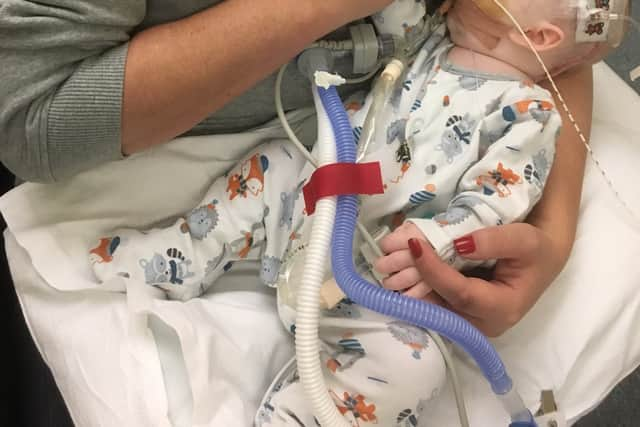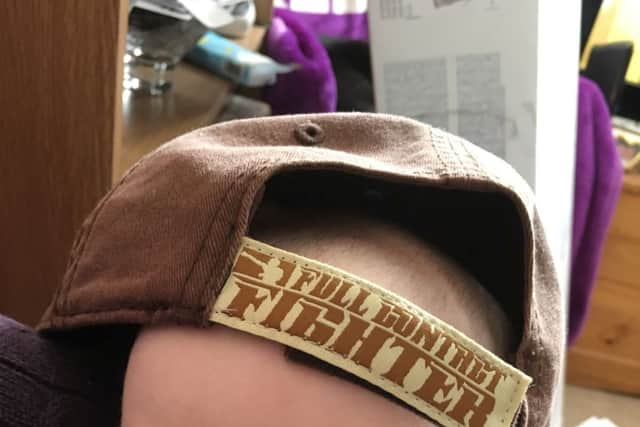‘Our baby was diagnosed with a brain tumour, so we moved our wedding so he could die with the family surname’
and live on Freeview channel 276
A couple moved their wedding forward so that their baby boy with a brain tumour would die with the family surname.
Jacob Goodall was just four weeks old when he was diagnosed with a rare, fast-growing tumour called an atypical teratoid rhabdoid tumour (ATRT). His parents Kate and Andy Goodall, both 44, were told his chances of survival were incredibly slim. This made them decide to bring their wedding forward, so that if the worst were to happen, Jacob could die with a family surname.
Advertisement
Hide AdAdvertisement
Hide AdWhen he was four months old, little Jacob tragically died in his parents arms. At the time of his death, the whole family legally had the same surname - thanks to Kate and Jacob being given special dispensation from the Registrar General to marry quickly.
Kate said: “This is something usually only reserved for serving military and terminally ill adults, but if we were going to lose Jacob, I didn’t want him to go with a different surname to mine. It meant so much to all of us to be able to do it.”
The family also managed to drive Jacob to Kate’s hometown, Dumries, in Scotland, before he tragically died - so he could meet her parents, grandpa and wider family and friends. Kate said: “That was hugely important to me; we had a lot of laughs and fun, but it was also very emotional.”


Jacob was diagnosed with ATRT when his parents took him to Queen Alexandra Hospital in Portsmouth, where they were living at the time, with acid reflux. There, a consultant noticed that Jacob had slight facial paralysis, because when he cried, one of his eyes didn’t fully close. He was also breathing noisily and had an obstructed airflow, prompting medics to investigate further.
Advertisement
Hide AdAdvertisement
Hide AdHe was subsequently moved to Southampton General Hospital, where the extremely rare tumour was confirmed. “He was only four-and-a-half weeks old,” Kate said. “Although hoping for the best, I think in my heart of hearts, I knew we were going to lose him.”


Doctors admitted that Jacob’s chance of survival was “very slim”, but said they wanted to try operating. Jacob underwent surgery on 8 September 2016, and spent the next three weeks on ventilators in the paediatric intensive care unit. 95% of the tumour had been removed during the operation, which was “far more than they thought they could achieve” and gave Kate and her husband Jacob “some hope”.
But the couple was still aware of the reality of the situation, and so decided to tie the knot at the Portsmouth Registry Office on 16 September 2016. Although it was a far cry from the festival wedding they were planning for 2017, it meant the whole family officially had the same surname.


When they took Jacob to visit Kate’s hometown in October, there were “a lot of laughs and fun”, even if the experience was very emotional. But things quickly took a turn for the worse when Kate noticed that, while her “papa was cuddling Jacob”, her baby had “turned blue”.
Advertisement
Hide AdAdvertisement
Hide Ad“There was clearly something not right,” she said, “and goodness knows where it came from, but the training kicked in and we kept him going with CPR until the ambulance arrived.” Jacob was then taken to Dumfries and Galloway Royal Infirmary, where he stayed for two weeks with bronchiolitis.


In mid-November, Jacob returned home but struggled to breathe. He needed to be resuscitated, and a subsequent MRI scan showed that the tumour had returned - and was bigger than it had initially been. “They also found a tumour on his kidney,” Kate said. “At that point, we knew it was over.”
Jacob died peacefully in his parents’ arms on 24 November, 2016. Kate is now planning to embark on the 10,000 Steps a Day in February challenge to raise funds for Brain Tumour Research.
Speaking of her fundraising challenge, Kate said: “I want to do this for Jacob. It’s so important to me. If just one penny I raise helps other families avoid the heartbreak we’ve been through, then it’s worth it. Hopefully, the wee guy will be with me every step of the way.”
Advertisement
Hide AdAdvertisement
Hide AdMatthew Price, community development manager at Brain Tumour Research, said: “We’re so sorry to learn that baby Jacob died at such a young age from a brain tumour. We’re really grateful to Kate for taking on the 10,000 Steps a Day in February challenge, as it’s only with the support of people like her that we’re able to progress our research into brain tumours, and improve the outcomes for patients like Jacob who are forced to fight this awful disease.”
Comment Guidelines
National World encourages reader discussion on our stories. User feedback, insights and back-and-forth exchanges add a rich layer of context to reporting. Please review our Community Guidelines before commenting.
